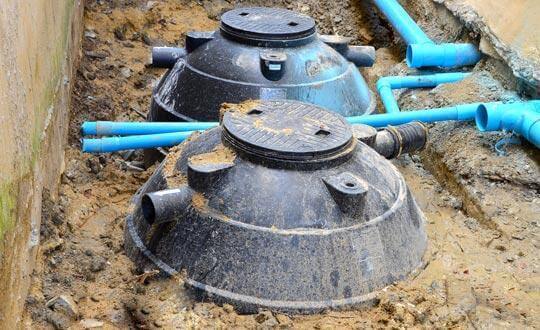Why Are Sewage Treatment Plants Required?
Sewage treatment plants offer homes and commercial properties an off-mains alternative to using the public sewer network, providing a cost-efficient and environmentally friendly way to safely dispose of wastewater.
They’re popular in rural areas as they are very self-sufficient, but their environmental benefits mean they’re being adopted elsewhere too. In certain areas, sewage treatment plants might even be required, especially as they offer a much cleaner discharge in comparison to the more common septic tank.
In this article, our experts take a look at when and why you might require a sewage treatment plant.
What Are Sewage Treatment Plants?
Sewage treatment plants provide an effective way for wastewater and sewage to be safely broken down in your back garden or on the premises of a commercial property.
Waste is pumped from a building through piping and into a sewage treatment plant, which is usually buried below ground outside. The sewage treatment plant then separates solids and liquids, before using bacteria to break down harmful substances in the wastewater.
A sewage treatment plant runs on electricity, which allows fans to circulate the air to enable the breakdown to take place. The resulting effluent is incredibly clean and can ordinarily be released directly back into a local watercourse, or even be recycled and reused after further treatment.
Why Would You Need a Sewage Treatment Plant Installed?
Sewage treatment plants provide a number of benefits over public sewers. Given their cost-effective and environmentally friendly treatment process, there are a number of different scenarios in which they might need to be installed.
Here are the most popular reasons for having a sewage treatment plant installed, on either a commercial or personal property:

1. As an Off-Mains Sewer Solution
Sewage treatment plants provide you with a waste disposal method that’s completely independent of the public sewer works. They are incredibly self-sufficient, which is why they are one of the most popular choices for properties in rural areas that often have no access to public mains.
As an alternative off-mains sewer solution, sewage treatment plants also offer a way out of expensive sewer bills. For large commercial properties paying high rates to the local council for these services, a large sewage treatment plant can actually be a worthwhile long-term investment.
Sewage treatment plants require electricity to run of course, but they can easily be hooked up to the local electrics or even be powered by a generator.
2. In Areas of Environmental Concern
Sewage treatment plants produce a seriously clean effluent after breaking down the bacteria in the waste that’s pumped through the system. After separating solids from liquids, liquids go through a rigorous treatment process before they are released from the system.
In many parts of the country – especially rural areas – properties are often built close to watercourses that act as points of water supply for the community, or in areas of natural beauty or environmental concern that have fragile ecosystems.
In these situations, wastewater can only be released back into the environment once it’s first undertaken appropriate treatment. Sewage treatment plants produce an effluent that is clean and safe enough to be released into local watercourses, without harming the environment or contaminating drinking supplies.
Businesses may opt to install sewage treatment plants over other methods of waste disposal if they are looking to raise their environmental profile and help local ecosystems.
3. If You Require Little Maintenance and Upkeep
Sewage treatment plants work well in rural areas because they require such little upkeep. The system is very self-contained and only requires emptying once a year, alongside a stable supply of electricity.
Once the system has been installed, it can keep functioning efficiently for years as long as sludge isn’t left to build up inside the tanks. This not only helps to keep running costs down, but it’s perfect for anyone who needs an off-mains sewage system but doesn’t want to have to deal with anything too hands-on.
4. If Minimal Odours Are Desired
Sewage treatment plants are incredibly efficient and self-contained, and the resulting system is surprisingly odour free.
This is a huge bonus if your local sewer system is causing you pains or if you need to keep smells down to a minimum in your household or business premises.
A sewage treatment plant shouldn’t produce any nasty smells, so if you smell something it’s an indication that you may have a problem and you need to have it checked out.
Sewage Treatment Plants vs. Septic Tanks
It’s important to remember that sewage treatment plants are not septic tanks. In fact, sewage treatment plants are usually installed when septic tanks don’t meet the requirements of the job.
Septic tanks work in a similar way, however they don’t run on electricity and won’t produce as clean an effluent at the end of the treatment process. Many properties are required to have a sewage treatment plant rather than a septic tank if they need to disperse wastewater directly into a local watercourse.
Because the sewage treatment process is so much cleaner, wastewater can be directed into local streams or areas of environmental concern. The wastewater from a septic tank however, could cause contamination to drinking water and to the environment, which makes the sewage treatment plant much more environmentally friendly.
While septic tanks are great for small private properties, they are also difficult to scale up in size. Larger properties and commercial businesses often find that a sewage treatment plant is much more effective at dealing with larger quantities of waste than a septic tank would be.
Contact OMDI Today for Your Free Quote
Our expert team here at OMDI has years’ experience designing, installing and maintaining sewage treatment plants, alongside many more off-mains drainage and treatment solutions.
Our friendly and professional staff are happy to help if you’re looking to find out more about sewage treatment plants. Contact OMDI today for more information and to request a free quote.
